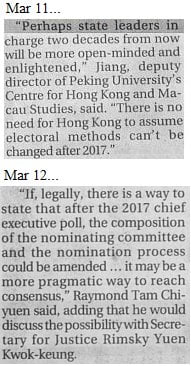The story so far… Hong Kong’s pro-democrats are demanding an open system of nomination for Chief Executive candidates when/if universal suffrage is introduced in 2017. Beijing, rather than come clean about the requirements of a Leninist one-party state, insists that (the vaguely worded) Article 45 of the Basic Law and related rulings make this unlawful.
Yesterday, one Expert Jiang of Peking University opined that the electoral methods that the Basic Law carves in stone can somehow be changed at a later date – the unlawful thus mysteriously becoming lawful. An obvious way to make this statement logical would be to propose changing the Basic Law itself in some way, but  Expert Jiang makes no mention of that, simply foreseeing a more liberal mindset among the nation’s leaders. Conclusion: Beijing is pushing ‘it can be changed later’ in a lame attempt to break the logjam, reflecting concerns that the pro-democrats will not yield and will veto reform.
Expert Jiang makes no mention of that, simply foreseeing a more liberal mindset among the nation’s leaders. Conclusion: Beijing is pushing ‘it can be changed later’ in a lame attempt to break the logjam, reflecting concerns that the pro-democrats will not yield and will veto reform.
Today, Hong Kong Constitutional Affairs Secretary Raymond Tam comes forward with much the same idea. He ponders mentioning a possibility of future change in the ‘report’ Hong Kong formally makes to Beijing ahead of constitutional reform. It is hard to imagine that any moderate pro-dems would back the government’s eventual package as a result. However, they could – for the sake of entertainment – try to pin Tam down by demanding exactly what sort of changes to the post-2017 nomination process would be possible. Only Beijing could answer that, and of course it won’t.
More to the point, they could highlight the illogicality. If Article 45 allows a more-open nomination system than the yet-to-be-decided/announced one for 2017, why not adopt it for 2017? Conversely, if it bars anything more open than whatever is in store for 2017, how can it stop barring it at a later date? In the absence of a satisfactory logical response, the pro-dems could safely conclude that the Expert Jiang/Raymond Tam suggestion is a con. That in turn would suggest – or confirm – that the pro-dems, in their own little way, are making Beijing officials feel frustrated, in the way a dog might if it tried to wag, and the tail refused to.
The prospect of the pro-dems vetoing a reform bill delights some less-sophisticated members of the pro-Beijing crowd. To them, the pro-dems ‘lose’ if Hong Kong moves no closer to universal suffrage; therefore they ‘win’. It’s a childish way of looking at it, but that’s how dull-witted followers of the schoolyard bully feel towards the nerdish weakling outsiders.
What will happen if no reform takes place in 2017? Beijing could change tack and appoint a different sort of person as CE, to appeal to the broad population. (Like it did with Donald Tsang, only… different.) The problem is that the Chinese Communist Party emphasizes building support through winning the loyalty of groups and sectors and penalizing anyone else, rather than by winning millions of individuals’ hearts and minds. That’s the way it’s been since – who knows – the day after October 1, 1949, perhaps. (Lets face it: hearts and minds is hard work.)
So the status quo means that the downward spiral probably continues. An unpopular administration relies increasingly on vested interests for support; free lunches for vested interests damage the people’s well-being; the administration’s unpopularity increases, and so on.
Beijing could unilaterally impose a stronger executive system anytime, courtesy of the ‘Basic Law interpretation’ device that allows it to change the meaning of any clause in the mini-constitution. The problem with decisive, Singaporean-style government is that you need to censor the press and imprison opponents, and have a sheep-like populace go along with it.
The overall outlook is not very encouraging, and we can expect pro-dems, thoughtful Beijing officials and our local colonial-minded leaders to all get increasingly worried about who and what might ‘lose’ if reform fails.
 The ‘comments’ system below isn’t, at the time of writing, working. The box sends comments from WordPress to an email account, and they are arriving with no content. It’s a mystery, and the sort of challenge I can easily resist. Maybe it will fix itself.
The ‘comments’ system below isn’t, at the time of writing, working. The box sends comments from WordPress to an email account, and they are arriving with no content. It’s a mystery, and the sort of challenge I can easily resist. Maybe it will fix itself.
